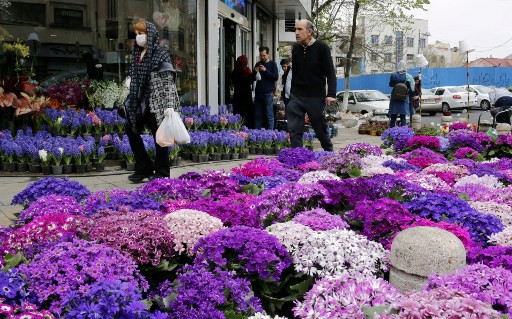Popular Reads
Top Results
Can't find what you're looking for?
View all search resultsPopular Reads
Top Results
Can't find what you're looking for?
View all search resultsCalls and messages replace Iranian New Year's gathering amid COVID-19 pandemic
The COVID-19 outbreak has overshadowed the celebration of Nowruz, the the Persian New Year, forcing Iranians in Indonesia and elsewhere to avoid face-to-face contact and instead resort to sending virtual messages.
Change text size
Gift Premium Articles
to Anyone
If there was one thing that Mohammad Azad was supposed to do in his first year as Iranian Ambassador in Jakarta, it would have been to host a gathering of compatriots, colleagues and like-minded friends to celebrate the Persian New Year.
But the senior diplomat ultimately decided against it amid the heightened risks of COVID-19 infection, which has spread to more than 246,000 people worldwide.
The Persian start to the calendar, commemorated globally as the International Day of Nowruz, can be literally translated as "New Day". It is an ancient celebration and the biggest national holiday in Iran, where families gather in high spirits to dine and exchange gifts.
In their homes, Iranians would assemble their haft sin, a traditional tabletop arrangement of seven items marking the celebration of the holiday. The names of the seven items must begin with the Persian letter seen (s) and each item represents a different hope for the New Year.
The four most common items are sabzeh (grass), symbolizing rebirth and renewal; senjed (dried fruit), symbolizing love; sib (apples), symbolizing beauty and health; and seer (garlic), symbolizing medicine and self-care.
In 2010, Nowruz was recognized by the United Nations General Assembly as a spring festival of Iranian origin that has been celebrated for more than 3,000 years. It has become a public holiday in several other countries, including Afghanistan, Azerbaijan, Kazakhstan and Turkmenistan.
However, this year's celebration, which falls on Saturday, has been overshadowed by the global COVID-19 pandemic, as Iran becomes one of the world's hardest-hit countries with an infection rate of 50 people per hour and a death toll of 1,284 that continues to climb at a rate of one person every 10 minutes, Reuters reports.
Meanwhile in Indonesia, there are 369 people who have tested positive for the disease and 32 who have died as of Friday afternoon, making it the highest fatality rate in the world — barring all unconfirmed or probable cases.
This situation has driven Azad to decide that instead of hosting the customary gathering of the Iranian community and other friends at his official residence in Menteng, Central Jakarta, he would send them well wishes through letters, voice notes and phone calls.
“Because of the new situation, I have sent voice notes and messages to our Iranian communities. In my message, I said that because of the coronavirus we have to be careful and to manage that, we are going to have this exchange of messages,” the envoy told The Jakarta Post on Friday, referring to the virus that causes COVID-19.
The Iranian people celebrate Nowruz the way Idul Fitri is celebrated in Indonesia, by visiting relatives and friends. Many people usually extend their holidays for up to two weeks, using that time to visit friends and family and travel out of town to tourist spots and/or religious sites.
“I hope that when we have managed [to contain] the coronavirus, we can have another festival — maybe after Ramadan and during Idul Fitri. Hopefully, [by] that time we can [...] have face-to-face interactions,” Azad said.
Idul Fitri is the biggest holiday on the Islamic calendar, which celebrates the victory of the spirit at the end of a month-long fast undertaken globally during the holy month of Ramadan. This year it will likely fall on May 28.
Meanwhile in Iran, millions of people are now confined to celebrating the New Year within their own walls, although the police have said that many still defied warnings from health officials to stay home and avoid crowds by heading to the Caspian coast, a favorite destination during the Nowruz holidays, according to Reuters.
Indonesia has imposed a temporary travel ban for people with a history of travel to Iran, together with countries like Italy and South Korea that have been hit the hardest by COVID-19, in its efforts to curb the spread of the disease in the archipelago.
Foreign Minister Retno LP Marsudi called her Iranian counterpart on Wednesday, expressing condolences for the deaths caused by the COVID-19 outbreak in Iran, said the ministry’s director for Middle East affairs, Achmad Rizal Purnama. Retno also conveyed the importance of international cooperation in handling the outbreak, he said.
“The international cooperation aspect in overcoming this problem must continue to be encouraged,” Rizal told reporters on Thursday.
From the Iranian side, Azad said his minister also used the opportunity to ask the Indonesian government not to follow the “unilateral [...] and inhumane sanctions" that the United States has imposed on the people of Iran, particularly given the spread of the pandemic.
He said the sanctions have had an effect on the country's ability to procure the medical equipment required to respond to the public health emergency, on top of the massive pressure it puts on Iran's economy.
Reuters reported Friday that the US imposed new sanctions this week, arguing that its “maximum pressure” campaign to curb Iran’s nuclear, missile and regional activities does not stop the flow of humanitarian goods.
The Donald Trump administration blacklisted five companies based in the United Arab Emirates, three in mainland China, three in Hong Kong and one in South Africa for trade in Iran’s petrochemicals.










